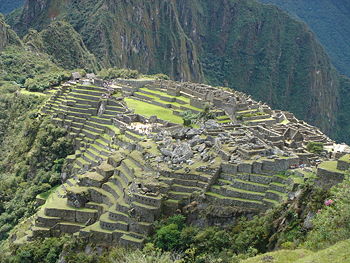Machu Picchu: Difference between revisions
Jump to navigation
Jump to search

imported>Joe Quick mNo edit summary |
imported>Joe Quick mNo edit summary |
||
| Line 2: | Line 2: | ||
'''Machu Picchu''' is an [[archeology|archaeological]] site in the [[Andes]] just northwest of [[Cusco]], [[Peru]]. It was built by the [[Inca]]s in about 1450 AD and is thought to have served as a sort of royal estate for the emperor. The site was abandoned at about the time of Spanish conquest but escaped the destruction that was wreaked on other Inca sites by the conquistadors. Rediscovered by [[Hiram Bingham]] in 1911, the site has become an enormously popular tourist destination, drawing hundreds of thousands of visitors every year. It is a UNESCO World Heritage Site.<ref>See the UNESCO website at http://whc.unesco.org/en/list/274</ref> | '''Machu Picchu''' is an [[archeology|archaeological]] site in the [[Andes]] just northwest of [[Cusco]], [[Peru]]. It was built by the [[Inca]]s in about 1450 AD and is thought to have served as a sort of royal estate for the emperor. The site was abandoned at about the time of Spanish conquest but escaped the destruction that was wreaked on other Inca sites by the conquistadors. Rediscovered by [[Hiram Bingham]] in 1911, the site has become an enormously popular tourist destination, drawing hundreds of thousands of visitors every year. It is a UNESCO World Heritage Site.<ref>See the UNESCO website at http://whc.unesco.org/en/list/274</ref> | ||
==Notes== | |||
<references /> | <references /> | ||
Revision as of 23:49, 25 December 2007
Machu Picchu is an archaeological site in the Andes just northwest of Cusco, Peru. It was built by the Incas in about 1450 AD and is thought to have served as a sort of royal estate for the emperor. The site was abandoned at about the time of Spanish conquest but escaped the destruction that was wreaked on other Inca sites by the conquistadors. Rediscovered by Hiram Bingham in 1911, the site has become an enormously popular tourist destination, drawing hundreds of thousands of visitors every year. It is a UNESCO World Heritage Site.[1]
Notes
- ↑ See the UNESCO website at http://whc.unesco.org/en/list/274
